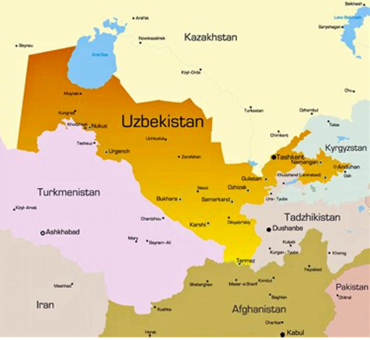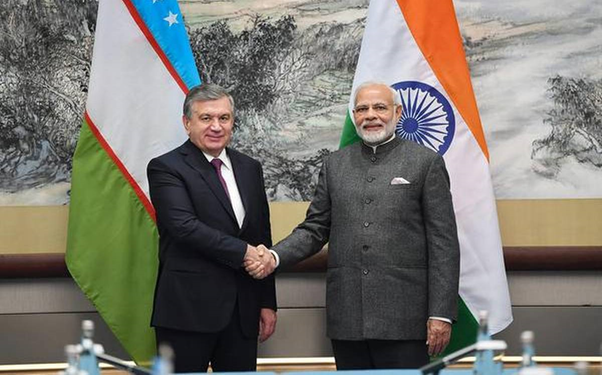India – Uzbekistan Relations
Relevance
- GS 2 Bilateral, Regional, and Global Groupings and Agreement involving India and affecting India’s Interest.
- Tags: #India #Uzbekistan #samarkand #currentaffairs #upsc
Why in the News?
It is expected that the upcoming tourism summit in Samarkand will bolster Uzbekistan’s ties with India.
- India and Uzbekistan have relations that go back in history. India was one of the first countries to recognize the state sovereignty of Uzbekistan after the latter’s independence. The protocol on establishment of diplomatic relations between India and Uzbekistan was signed in Tashkent on 18 March 1992.
- During the summit from October 16th to 20th, there will be an investment forum aimed at attracting more investments for Uzbekistan. The nation is also exploring educational partnerships. Tourism, which not only delves into history but also fuels global economies, is a key focus. It promotes inclusivity and embodies the principle of treating every guest like family in Uzbek culture.
Bilateral and Multilateral Mechanisms
National Coordination Committees
- India and Uzbekistan have established National Coordination Committees to oversee mutually agreed projects and initiatives.
- Indian Committee led by MOS(VM) and comprising senior MEA officials and a representative from the Government of Gujarat.
- Uzbek Committee led by Sardor Umurzakov, Deputy Prime Minister for Investments and Foreign Economic Affairs-Minister of Investments and Foreign Trade (MIFT).
- First meeting held on 24 August 2020, reviewing projects and aspects of bilateral cooperation in trade, investment, and education fields.
Inter-Governmental Commission (IGC)
- The 13th meeting of the Uzbek- Indian Intergovernmental Commission on Trade, Economic, Scientific and Technical Cooperation held on 28 July.
- Chaired by Deputy Prime Minister- Minister of Investment and Foreign Trade of Uzbekistan and Minister of Railways, Trade, and Industry of India.
JWG on CT (Counter Terrorism)
- Identified areas for training and capacity building in law enforcement and counter-terrorism operations.
Defence Cooperation
- Strengthened following high-level visits, agreements, and joint military exercises.
- Notable agreements include MoUs on Military Medicine and Military Education.
Joint Military Exercises
- The first-ever joint military exercise between India and Uzbekistan took place from 4-14 November 2019 was named Dustlik.
- The armies of both countries conducted a series of exercises focused on counter-terrorism operations.
- India assisted in setting up an “India Room” at the Armed Forces Academy of Uzbekistan in Tashkent.
Common Perspectives
- India and Uzbekistan share common perspectives on various security issues, including counter-terrorism, organized crime, and illegal trafficking.
- Focus on assistance in training and capacity building for Uzbek security agencies.
Bilateral Trade and Investments
Bilateral Trade
- Bilateral trade at around USD 690 million, though well below potential.
- Key items of India’s exports and imports from Uzbekistan, including pharmaceuticals, mechanical equipment, and agricultural products.
Preferential Trade Agreement (PTA)
- A Joint Statement signed in September 2019 to initiate a joint feasibility study for entering into negotiations for a Preferential Trade Agreement (PTA).
Investments
- Indian investments in pharmaceuticals, amusement parks, automobile components, and the hospitality industry.
- Collaborations and investments in various fields, including pharma, healthcare, textiles, auto components, agriculture, and food processing.
Bilateral Investment Treaty (BIT)
- Ongoing negotiations for a Bilateral Investment Treaty between India and Uzbekistan.
Cooperation during the Covid-19 Pandemic
Covid-19 Assistance
- India provided medical assistance, including HCQ and Paracetamol tablets.
- Conducted e-ITEC programs for capacity building of medical professionals from Uzbekistan.
Vaccine Assistance
- 660,000 doses of Covishield vaccine delivered to Uzbekistan under the COVAX initiative on 17 March 2021.
Humanitarian Aid
- Uzbekistan provided 100 Oxygen concentrators and 2000 injections of Remdesivir to India during its fight against the second wave of COVID-19.
Joint Working Groups (JWGs) and Sectoral Cooperation
Textiles, IT, Pharmaceuticals, Agriculture, and More
- Various Joint Working Groups established to promote cooperation in textiles, IT, pharmaceuticals, agriculture, and other sectors.
Space Cooperation
- Collaboration in space cooperation, including the formation of a Joint Working Group.
Development Assistance and Line of Credit (LOC)
Line of Credit
- Agreements for Line of Credit (LOC) to support construction of affordable housing and social infrastructure projects.
- Ongoing discussions on further LOC projects and assistance.
Entrepreneurship Development Center (EDC)
- Inauguration of India-Uzbekistan Entrepreneurship Development Centre (EDC) in Tashkent.
- Indian expert’s deputation for training and capacity building of Uzbek entrepreneurs.
Grant Assistance
- India offers grant assistance for High Impact Community Development Projects in Uzbekistan.
Education and Culture
ITEC Program
- Uzbek professionals have been trained under the Indian Technical and Economic Cooperation (ITEC) program.
- More than 2400 Uzbek professionals have undergone training in India.
- These are the key points organized with subheadings for clarity and ease of reference.
Tourism
- The Uzbek government has extended the e-Visa facility to Indian tourists.
- Uzbekistan has also emerged as a significant source of medical tourism with about 8,000 Uzbeks annually seeking medical treatment in India.
Challenges in India-Uzbekistan Relations
- Low Trade and Commerce: The bilateral trade and commerce between India and Uzbekistan remain significantly underutilized, representing a key challenge. The potential for economic exchange and collaboration has not been fully harnessed.
- Connectivity Issues: Uzbekistan’s status as a landlocked country contributes to connectivity challenges. Air connectivity between the two nations is not as robust as desired, hampering swift and efficient exchanges.
- Belt and Road Initiative (BRI): The extensive influence of China’s Belt and Road Initiative in Central Asian countries, including Uzbekistan, poses a challenge. China’s growing presence in the region may alter the economic and geopolitical landscape.
- Cultural and Language Differences: Cultural and language disparities can pose obstacles in understanding and communication between the two nations, affecting cooperation in various sectors.
- Geopolitical Complexities: The geopolitics of Central Asia, including the presence of other major powers in the region, adds complexity to India-Uzbekistan relations and influences regional dynamics.
Way Forward
- Leveraging Trade Agreements: Indian companies should capitalize on Uzbekistan’s trade agreements and explore mutually beneficial investment projects. This approach can unlock the untapped economic and trade potential of both nations.
- Enhanced Convergence: There is a pressing need for increased convergence between India and Uzbekistan, spanning economic, diplomatic, and strategic spheres. A shared vision and objectives will bolster cooperation.
- Joining INSTC: Uzbekistan should consider joining the International North-South Transport Corridor (INSTC). With India and Iran as existing members, Uzbekistan’s participation will foster improved connectivity, facilitating smoother trade and transit across the region. This move can help overcome landlocked challenges and expand economic horizons.
- People-to-People Relations: Encouraging people-to-people interactions, educational exchanges, and cultural initiatives can bridge cultural and language gaps, fostering a deeper understanding and trust between the two nations.
- Diversification of Trade: Diversifying trade beyond traditional sectors and exploring opportunities in emerging industries can lead to a more robust economic partnership.
|
About Samarkand
|
Sources: Indian Express
Mains Question
“Discuss the key aspects of India-Uzbekistan relations and the challenges they face in the context of regional and global dynamics. Analyze the potential areas of cooperation and suggest strategies for further enhancing this bilateral relationship.”





